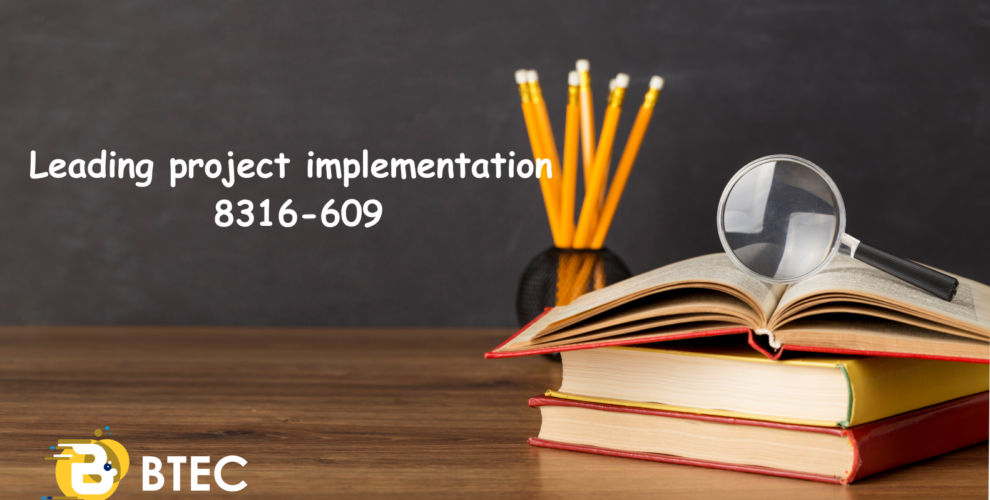About This Unit
The goal of this course is to help the student become a competent project manager by teaching them to critically analyse and evaluate projects in terms of risk, outcomes, and budget. After finishing the unit, students should be able to show that they have reviewed the most important findings and theoretical works in the field. Include a proper citation of this in their paper. Additionally, the project should show a convincing integration of theory and practice.
What You Will Learn
This unit provides students with the opportunity to focus on the three interrelated aspects of complex project management: planning, leading, and execution. Students can expect to get insight into such topics as “The nature and purpose of projects,” “Project planning and management techniques such as PERT, Gnatt charts and CPA.” and “Project financing and procurement”. Students will also examine the effects of project limitations (such as time, money, and personnel) on the management of projects. Students will get insight into the challenges of project management and their impact on productivity. Furthermore, students will examine the Feasibility and risk assessment approaches and master budget management and variance analysis and reporting abilities thus offering learners a full insight into the budgetary assessment in project management. This lesson will further help learners study Identification and communication with stakeholders, monitoring and reporting on project progress and attainment of milestones and goals. Finally, the learners will take a dive into Project evaluation and reporting and using project evaluation to reflect on personal performance and skills. Therefore, students will understand why an intervention is necessary, how it can be implemented efficiently, and how long its effects will last. They will also be able to address concerns of causation and provide evidence for why certain outcomes and goals are or are not being attained.
This Unit is Suitable for Persons Who
This unit is geared for both newly promoted senior managers and middle managers looking to advance their careers. It is also suitable for students working toward senior management positions who are aim to develop their capacity for critical analysis and self-reflection. It is useful for l earners who wish to advance from Level 5 to Level 7 who can do so with the help of this stepping stone because credits can be transferred. For the ILM Level 7 Certificate or Diploma in Executive Management, for instance, students can transfer 12 credits, while for the ILM Level 7 Certificate or Diploma in Strategic Leadership, students can transfer 6 credits. It’s perfect for anyone hoping to get insight into what it takes to be a senior management, as well as for those who want to take an objective look at how they’ve performed thus far. In addition to helping employees, this is useful for companies that wish to prepare their top executives for future roles and give aspiring top-level managers a means of self-evaluation.
Learning Outcomes
This unit has three learning outcomes and that is to make recommendations to improve resource capacity and utilisation in own area of responsibility. This learning outcome is broken down into three assessment criteria. The first is to plan a complex project which is divided into four assessment criteria namely; Determine the feasibility and risks associated with a proposed project, agree the goals and success criteria for the project, plan the project and identify the financial and other resources required, using a standard method and appropriate project management tools and select an appropriate project team. The second outcome which is divided into four assessment criteria is to lead a complex project to a successful. To meet this outcome, the learner will; Lead the project team to achieve project milestones and goals, monitor progress and take action to rectify problems or recover failure, manage the project budget, identifying any variances and taking appropriate action and ensure full engagement of stakeholders with the project. The third and final learning outcome is to evaluate a complex project. To meet this outcome the learner will complete two assessment criteria and that is developing and implementing an appropriate evaluation tool for the project and reporting on the outcomes to stakeholders and reflecting on and learning from the outcomes of a project
What are the Entry Requirements?
This unit is a qualification for level 6 certification which is available at three different levels: an introductory Award, an intermediate Certificate, and an advanced Diploma. This credential is broken down into smaller pieces called “units,” and each unit is meant to impart a specific body of information or expertise. Students advance in knowledge and competence as they progress through ILM’s six levels. Before being accepted to level 6, the student should have a substantial number of credits across multiple types of level 5 certifications. To qualify for an award, a candidate, for instance, must take 6 of the 12 required credits, as well as participate in at least 1 hour of orientation and 3 hours of tutorial support. A minimum of 13 credits, including an introductory session and tutorials totalling at least 3 contact hours, must be completed in order to receive a certificate. As a last step toward graduation, students need to earn 37 credits, sit through a two-hour orientation, and complete seven hours of tutoring. Credits earned at Level 5 can be carried over to Level 6. However, these eligibility standards are set by legal frameworks. They roughly correspond to managerial levels. They also serve to draw attention to the difficulty of a certification process. Because of this, although while the majority of ILM credentials are vocational in nature and the levels correspond to certain educational instruction, you may need to either skip a level or start at a lower level than you are currently at if you wish to advance in your academic career. One could have a bachelor’s degree in economics, but no experience managing a project or leading a team, necessitating a lower-level vocational certificate even though level 6 is equivalent to the third year of an undergraduate degree.
How We Can Help
The study for an ILM degree can be challenging and time-consuming, taking away from your ability to participate in other academic and social activities. In the event that you are in need of assistance with an ILM project, you can rely on us to put you in touch with skilled expert writers that are familiar with the subject matter. They will ensure that you comprehend everything that is required in order to achieve the grades you seek. Our main objective is to provide students with resources that can assist them in achieving their academic and professional objectives. Our experts put in the extra effort and time required to perform exhaustive research for your Leading Project implementation assignments so that you can be certain you will receive the marks you desire. If you use our service, you can be assured that you will not be failing which means that we will save you a significant amount of money on retakes. In addition to this, we make certain that each and every task is finished on time. No matter the deadline, we can assure that you will deliver the paper before any penalties are issued. Furthermore, you can relax knowing that the standard of your project will not suffer in the event that we are given a request at the eleventh hour. We have a stringent policy against plagiarism; hence we guarantee to deliver original content that is one hundred per cent unique to each of our customers. Before delivering any work to you, we make certain that our ILM assignment-help experts subject these documents through a range of plagiarism detection software to verify that they are original. We exist to contribute to the academic development of our clients. Because of this, we only engage individuals who have substantial prior experience working within the ILM curriculum; consequently, you will have the peace of mind that comes along with knowing that your study will be meticulously documented. No matter what level of the ILM you are working on, our writers will utilize their extensive expertise as well as their thorough knowledge of the subject area to satisfy the requirements and standards of the test. We understand that Students typically have limited financial resources at their disposal. Hence, we strive to provide price plans that are as adaptable as possible to fit a variety of budgets. Because we want students of all different socioeconomic backgrounds to be able to make use of our services, the prices that we charge for providing assistance with ILM assignments are kept to a minimum. If you are unhappy with the finished paper, the ILM assignment help writers are at your disposal to revise the project at no additional cost to you. In addition, we provide editing and proofreading services, and we are more than happy to evaluate your work for you and make any necessary corrections. If you have any questions, please don’t be afraid to give us a call or send us an email. At any moment of the day or night, our customer service team is available to answer any queries you may have regarding your assignments. We are eager to be of assistance to you.
Resources Used for the Unit
There are various publications that are provided for learners wanting to pursue this unit. The following are a few of them that are widely used by institutions all over the world.
Bravo, A. S., Vieira, D. R., Bredillet, C., & Pinheiro, R. (2021). Review of collaborative project management approaches in R&D projects. In Managing Collaborative R&D Projects (pp. 47-63). Springer, Cham.
Guo, K., & Zhang, L. (2022). Multi-objective optimization for improved project management: Current status and future directions. Automation in Construction, 139, 104256.Baka, A. (2019). The impact of supplier base optimization on organizational performance.
Kerzner, H. (2019). Using the project management maturity model: strategic planning for project management. John Wiley & Sons.
Kerzner, H. (2018). Project management best practices: Achieving global excellence. John Wiley & Sons.
Khomyakov, I., Mirgalimova, R., & Sillitti, A. (2020, March). An investigation of the project management approaches of agile and plan-based companies. In Proceedings of the 35th Annual ACM Symposium on Applied Computing (pp. 1662-1665).
Miller, D. (2019). The resource-based view of the firm. In Oxford Research Encyclopedia of Business and Management.
Müller, R., Drouin, N., & Sankaran, S. (2019). Modeling organizational project management. Project Management Journal, 50(4), 499-513.
Pace, M. (2019). A correlational study on project management methodology and project success. Journal of Engineering, Project, and Production Management, 9(2), 56.
Rowe, S. F. (2020). Project management for small projects. Berrett-Koehler Publishers.
San Cristóbal, J. R., Carral, L., Diaz, E., Fraguela, J. A., & Iglesias, G. (2018). Complexity and project management: A general overview. Complexity, 2018.
Tereso, A., Ribeiro, P., Fernandes, G., Loureiro, I., & Ferreira, M. (2019). Project management practices in private organizations. Project Management Journal, 50(1), 6-22..





